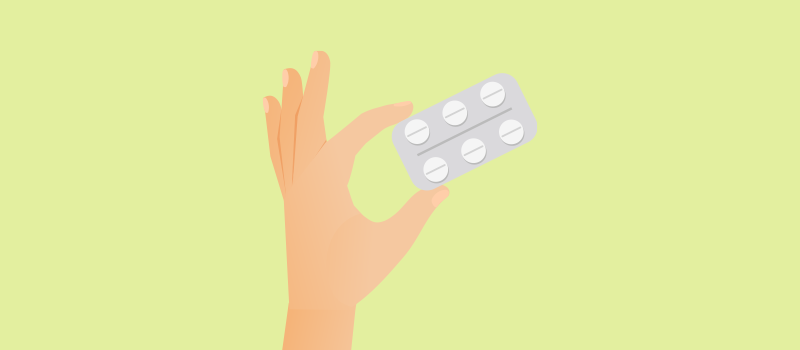What’s the Buzz
The Bee Healthy Blog
What Are Some Short-Term Prednisone Side Effects?

Key Takeaways
-
Short-term treatment with prednisone usually does not cause serious complications. However, long-term treatment can lead to potential risks of serious health complications.
-
Some short-term side effects of prednisone include fluid retention, increased appetite, insomnia, restlessness, indigestion, mood changes, high blood sugar, and hot flashes.
Prednisone, an oral corticosteroid medication, works to treat a wide range of conditions by reducing the activity of the immune system. However, taking prednisone can also lead to a range of both short and long-term side effects, as well as an increased risk of serious health complications.
Please continue reading to learn more about the side effects and risks of taking prednisone tablets.
What are the dangers of short-term prednisone?
Short-term treatment with prednisone usually does not cause serious complications. However, long-term treatment can lead to potential risks of serious health complications.
What are the side effects of long-term use of prednisone?
Some side effects develop after the long-term daily use of prednisone. Again, higher doses are more likely to cause serious side effects than low-dose prednisone. Some of the long-term side effects reported by many patients who took prednisone for a long time include:
-
Osteoporosis: Bone loss (decreased bone density and increased risk of bone fractures)
-
Skin bruising
-
Thinning of skin and hair
-
Moon face: the face can swell and get rounder
-
Muscle weakness
-
Delayed or impaired wound healing
-
Increased risk of bacterial, viral, and fungal infections
-
Eye problems such as cataracts or glaucoma (increased eye pressure)
-
Decreased growth in children
-
Psychotic symptoms
Talk to your doctor about what to look out for and different tips if you are concerned about the long-term side effects. See our full list of prednisone side effects.
Long-term side effects of prednisone
Prednisone can have several long-term side effects on the body. Some of these include:
-
Kidney damage
-
Stomach irritation and ulcers
-
Low bone density
-
Increased risk of infection
-
Vision problems
-
Mood changes
Let your doctor know if you have a history of heart disease or kidney issues before starting prednisone.
Talk to your doctor about drinking alcohol and taking nonsteroidal anti-inflammatory drugs (NSAIDs) like ibuprofen while taking prednisone.
Give your doctor or pharmacist a complete list of your medications, including prescription drugs, over-the-counter medications, dietary supplements, and herbal products.
Prednisone may be harmful to unborn babies, particularly during the first trimester of pregnancy. Tell your doctor if you are pregnant or plan to become pregnant before taking prednisone.
Does a short course of prednisone cause side effects?
People can use prednisone short-term for asthma exacerbation or an allergic reaction, while chronic prednisone use is typical for people with autoimmune diseases such as lupus and rheumatoid arthritis (RA).
Brief use of prednisone may lead to side effects such as mood changes, altered appetite, sleep disruptions, and energy level changes.
Some of the common short-term side effects of prednisone include:
-
Fluid retention causing swelling in the face, hands, ankles, and feet
-
Increased appetite
-
Insomnia (trouble sleeping)
-
Jittery or restlessness
-
Stomach pain and indigestion
-
Mood changes
-
Increased blood sugar
-
Increased sweating and hot flash
Other side effects that are less common include:
-
Behavioral changes like agitation, aggression, irritability, and psychotic symptoms
-
Blurred vision
-
Urinary difficulties
-
Headache
-
Fast, pounding, or irregular heartbeat
-
Ringing in the ears
-
Trouble breathing
-
Confusion
-
Delirium
-
Problems with thinking or speaking
The severity of these side effects is dose-dependent, with lower doses carrying a lower risk of adverse outcomes compared to higher doses. Your doctor or pharmacist can help you understand the risks versus benefits of prednisone treatment and recommend other treatment options for your medical conditions.
Though rare, prednisone can cause allergic reactions, including skin rash, hives, itching, swelling of the face, lips, mouth, or throat, and difficulty breathing.
What is prednisone used for?
Prednisone is used for many health conditions, such as adrenal gland problems, intestinal problems like ulcerative colitis and inflammatory bowel disease, multiple sclerosis, and inflammatory conditions of the skin, eyes, lungs, and kidneys. It is also used to treat certain cancers (e.g., leukemia, a blood cancer).
It is also used along with anti-rejection drugs to prevent the rejection of transplanted organs. Prednisone is a prescription medicine available as a tablet, a delayed-release tablet, and an oral solution.
Save on Your Corticosteroid Medications with BuzzRx!
Manage your corticosteroid medication costs with BuzzRx coupons. Here are direct links to substantial savings for each medication:
Remember, these coupons are widely accepted at over 60,000 pharmacies, including major chains like CVS, Walgreens, and Rite Aid. Just present your coupon at the pharmacy to ensure you're getting the best possible price.
References:

SOCIAL